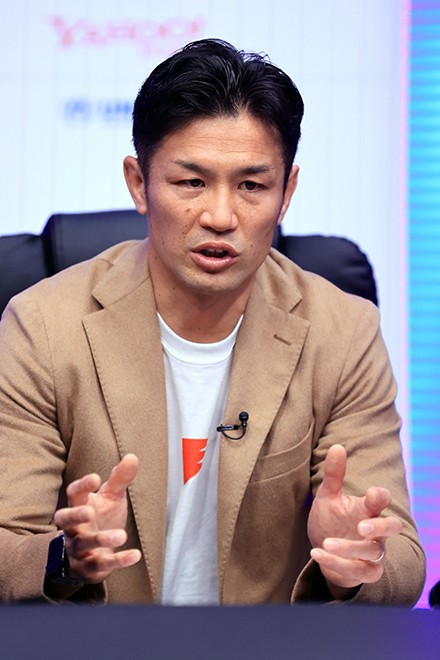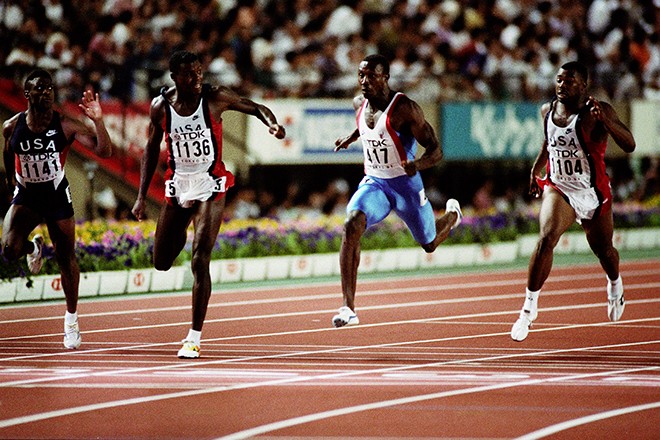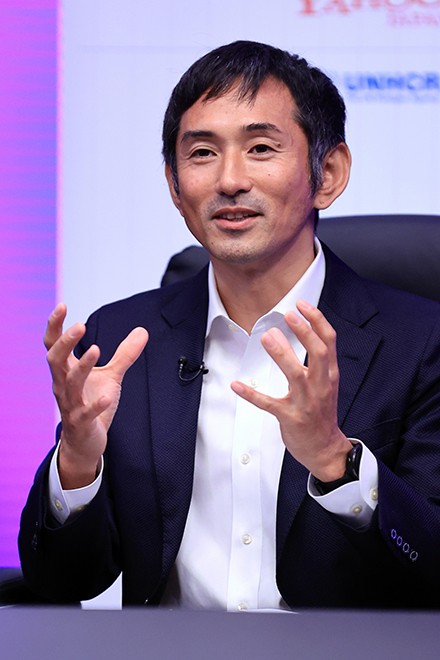THE ASAHI SHIMBUN
March 3, 2021 at 07:20 JST
Decorated Olympian Carl Lewis knows a thing or two about overcoming obstacles and working through difficult times, wisdom that he is now passing on to the next generation of track stars.
Lewis, 59, now an assistant coach at the track and field program at the University of Houston, his alma mater, said athletes should focus on themselves and forget the things they cannot control during the prolonged COVID-19 pandemic.
The former sprint and long jump gold medalist took questions from Dai Tamesue, 42, a three-time Olympian and former track star, and Toshiaki Hirose, 39, a retired rugby player who captained the Japanese national team under Eddie Jones, at an online roundtable discussion in January.
Lewis shared ways to cope with stress and offered encouragement to young athletes in Japan. In these challenging times, working on their weaknesses and trusting coaches and mentors will help them persevere through and make them even stronger, he said.
Excerpts of the discussion follow:

Hirose: Since I retired from playing professional rugby, I have worked on projects that support athletes finding a second career and help student-athletes to develop their leadership skills.
During the COVID-19 pandemic, I have launched another project called “Never Stop Playing Sports,” which seeks to help student-athletes stay motivated and ease their transition to the next stage in life. For instance, student-athletes can post a video on social media that highlights their competitions so that recruiters can see them. I embrace digital technology because it is difficult to have a face-to-face meeting right now.
I want people who are dedicated to sports to also do well in society, and I want to help build such an environment. I want to value support that goes beyond the bounds of all types of sports.
Lewis: I think it is wonderful. As you know, I teach and coach at the University of Houston right now. And it has been a challenge for everyone--athletes and students everywhere. So I think it is wonderful that you are finding a way to keep them inspired to continue on.
It is really difficult. Here at the university level, they are losing years. High school kids are losing their seasons. It has been a big challenge worldwide. It is just really wonderful to see that you are putting out something that can help make that transition a little bit easier.
Tamesue: I have been involved with an organization called Athlete Society, promoting sports in Asian countries and building a system for the development of athletes. Currently, we have a partnership in Bhutan, Nepal, Laos, Sri Lanka and Cambodia.
I want to ask you, if you were an active athlete right now during the pandemic, where would you direct your attention?
Lewis: Working at the University of Houston, I am constantly dealing with the challenges that we have with the athletes. But the biggest thing is that we have a new challenge and we take it on.
What I have told them is, “Since you are not able to compete and to travel and do these things, focus on some of the things you need to do to make yourself better.”
So they went on. If they needed to work on their starts, they worked on that. They worked on their running and all these different things that I taught them that they could do on their own.
What do you think is the worst thing (about your skills)? If you are a basketball player, you can work on your free throws. Work on something that you can make you better. You have to work on yourself.
You can’t worry about things that you can’t control. It is frustrating, but focus on yourself for a time, and be ready when the time comes back.
RETURN TO THE BASICS
Tamesue: I am trying to find ways in which retired athletes can do something for athletes who are actively competing right now. What do you think is the best encouragement that former athletes can offer?
Lewis: For young athletes, I have always tried to tell them to focus on the basics. They do not change. Hard work, getting your rest and guided nutrition--those are the things you can easily control.
And once you find a coach--someone that you trust in, listen to them. Believe them. Because they are there to help you.

Those are some of the things I try to tell young athletes. It’s not rocket science. It’s nothing new. The basics will always be here. Listen to your coach and get information. Now, with the internet, you can go online and find all different things.
But the biggest thing is, take the time, the extra time, to work on your craft. And then, when you have the information, share it and use the internet so everyone can benefit.
FIND MOTIVATION WITHIN
Hirose: I agree that the basics are important. But for young athletes, it is extremely difficult to continue to give their all when the future is uncertain. How do you keep them highly motivated?
Lewis: As an athlete, you are always going to deal with challenges. When I talk about the basics, that means that maybe you can’t get together with the team, so you may go to a stadium and run the steps, or you may go by yourself for a bike ride. Things like that.
Ultimately, an athlete has to find motivation from the inside. We--as coaches, mentors and family--are there to inspire. And how we can do it is, maybe, we share that time with them.
I always communicate to parents, “If you want your kids to get started in sports, just buy them a bicycle and go riding with them.” Or, buy a basketball and say, “Let’s go play.” Or, go for a walk together.
It encompasses a family. You can get family and friends and people together to do this kind of things. It does not always have to be specifically about the sport. It is just about moving and doing new things that keep yourself motivated to do it when the sport comes back.
STAY FOCUSED

Tamesue: I always remember how focused you were when you were in a competition. Nowadays, with social media, we can get a lot of information that is out there. And when we are uncertain what information is correct, it is difficult to shut out all the information and just focus on ourselves. Do you have any advice for athletes today on how to focus on a competition?
Lewis: That is so correct. There is so much information with social media. And I think that is a detriment.
You have to stay focused on what you know. Your job is to find someone (like coaches and mentors) that you trust in and believe in. That is where your information is. And challenge them to answer questions that you are not sure about.
Tamesue: Lastly, please send a message to athletes in Japan.
Lewis: First of all, I love Japan, and I look forward to seeing all of you at the Olympic Games. The Olympic Games are so special to me. So I look forward to that.
My biggest message for all of the young people is, "You are going to look back on this time in your life, how difficult it was and all the challenges that you had. And you will realize that you made it, you got through it.
Keep motivated. Stay focused. This won’t be forever. When it is over, you are going to realize, 'If I can manage that, I can manage any competition. I can manage any event and any challenge in life.'”
Because this is the biggest challenge we are all going to deal with in our lifetimes. And guess what? You are going to get through it. So, stay focused. It’s going to get better. It needs to get better. And in the end, you are going to be a better athlete and a better person.
(This article was written by Shuhei Nomura and Masaki Kono.)




















A peek through the music industry’s curtain at the producers who harnessed social media to help their idols go global.
A series based on diplomatic documents declassified by Japan’s Foreign Ministry
Here is a collection of first-hand accounts by “hibakusha” atomic bomb survivors.
Cooking experts, chefs and others involved in the field of food introduce their special recipes intertwined with their paths in life.
A series about Japanese-Americans and their memories of World War II